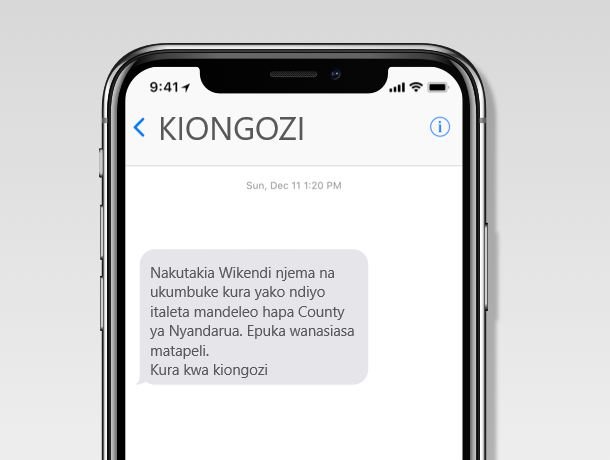It is that time of the election cycle when we start receiving unsolicited messages (SMS) from every politician. Brace for impact.
Your favorite politician, your worst politician, your current politician and your aspiring politician have suddenly developed an interest in you. Not exactly you, but your vote. You are just a means to an end; the vote.
And so they will keep sending you unsolicited messages telling you of great things about themselves ad how the future is you. They will keep telling you about your civic duty and responsibility as a citizen. The politician will wish you a happy Easter and even a happier Easter Monday. They will want you to celebrate Madaraka and Labour day in peace.
If you are wondering why they send these indirect messages and not directly ask you to attend their rally or vote for them, it is because political messages are highly regulated by telcos. Politicians know how to go around that.
You will also note that these messages do not come from a phone number, but possibly the name of the politician or political party. This is called a sender ID. It is a form of branding which allows you to know who us sending the message in the same M-PESA messages come from M-PESA and not a phone number.
These messages are a one-way communication channel, where you cannot reply. The politicians are not interested in your response. You should not be heard.
How did they Get my Number?
Whenever Kenyans receive any promotional messages, they assume that Safaricom or some other telco is selling their data.
What they forget is that our data has been poorly handled in the past. Every building you walk in keeps a record of your name, ID number and phone number with no guarantee that the information will be used for the right purposes. M-PESA agents used to keep a record of data which politicians could ‘buy’. There are many cases where data is collected with no reasonable use in mind.
This has often made it possible to access people private data without their consent. In some cases, some data that is illegally acquired is on sale.
The voter register in Kenya is in the hands of many people. Politicians can buy contacts for their region and keep spamming you with texts. Even a list of Safaricom subscribers has been in circulation for quite a long time now, and anyone with means and a few shillings can get access to it.
Personal Data Protection
In the past, there was now law to govern how personal data was handled in Kenya and this led to a culture where everyone could buy data and use as they saw fit. However, the Kenya Personal Data Protection Act passed in 2019 regulates how data is collected, shared and even used. One of those requirements is that a politician should not send you a message if you have not consented to receiving the message from them.
There is also an office where one can report any misuse of data, including when a politician sends you an unsolicited message. Instead of complaining about the politician, go ahead and let the Office of the Data Protection Commissioner know that you are being spammed.



Henry Murray Humphreys
February 10, 2022Thanks Jacob for the useful information.